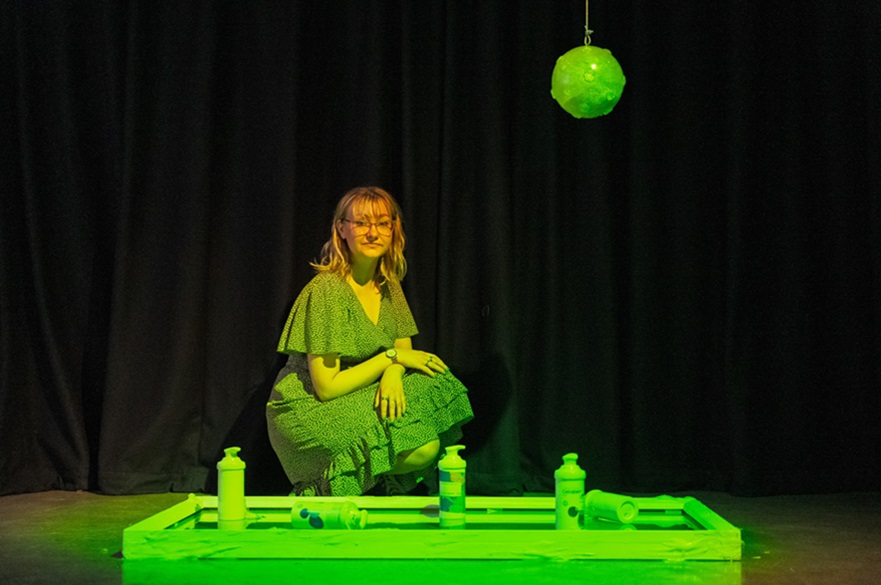Art made with human skin to raise awareness of rare condition
By Chris Birkle | Published on 22 May 2025
Categories: Press office; School of Art & Design;

A fine art student used her own skin to create a public installation to raise awareness of the skin condition ichthyosis.
Abigail Hutchinson-Dodd spent 12 months collecting flakes of her own skin and stored them in a jar to help create Are you contagious? for the 2025 at Nottingham Trent University (NTU) Graduate Festival.
The 21-year-old, who has had ichthyosis since birth which covers all of her skin, wanted more people to be aware of the condition and how it can affect an individual.
Using a vacuum, she collected flakes from her home and student accommodation and used a sieve to obtain the smallest pieces.
“It’s such an unheard of condition that even a doctor I went to once had never heard of it and was adamantly saying it was something else,” said Abigail, who is studying BA Fine Art in the Nottingham School of Art & Design.
“It has affected me. At school people weren’t very nice and would ask if they could catch it.
“I can’t sit in the sun too long. I struggle to cool down and don’t sweat much. I used to bleach my hair to remove layers of skin from my scalp for relief.
“It’s not just an average skin condition. Some people with it can even have blindness as their eyelids are so affected.
“So I wanted to incorporate it into my art to communicate the feeling of how it can affect people.”
Abigail’s installation centres on a pathogen-shaped sphere that is made from a transparent resin which features small stumps to represent spike proteins.
The pathogen is cast from a mould and the centre remains hollow so that the flakes of skin can be placed inside and seen by the viewer, resembling a dark patch.
The pathogen is hung from the ceiling over a small hospital linoleum flooring which is covered by a glass frame, with five clay emollient cream bottles on top.
Petroleum jelly coats various areas and the space is illuminated by green lights.
“My work speaks a lot to genetic mutation and a feeling of anxiety. A pathogen is invisible and provokes a fear of hygiene,” said Abigail. “And because of my skin, I am more likely to get infections as the epidermis is broken.
“When I first used skin in my art some people thought it was quite repulsive. But now people know what I do, they think it’s really interesting.”
Abigail’s work is on show for the 2025 Graduate Showcase, which see hundreds of art and design students putting their work on public display at NTU’s City Campus.
Fine Art senior lecturer Lisa Selby said: “Abi has shown how the choice of materials in art can make a significant difference to its meaning and can enhance the experience of the viewing public.
“Her installation communicates a strong but subtle message about ichthyosis and enables the viewer to develop a greater appreciation of the condition.”
Notes for Editors
Press enquiries please contact Chris Birkle, Public Relations Manager, on telephone +44 (0)115 848 2310, or via email.
Nottingham Trent University (NTU) has been named UK ‘University of the Year’ five times in six years, (Times Higher Education Awards 2017, The Guardian University Awards 2019, The Times and Sunday Times 2018 and 2023, Whatuni Student Choice Awards 2023) and is consistently one of the top performing modern universities in the UK.
It is the 3rd best modern university in the UK (The Times and Sunday Times Good University Guide 2023). Students have voted NTU 1st in the UK for student employability (Uni Compare 2025)
NTU is the 5th largest UK institution by student numbers, with over 40,000 students and more than 4,400 staff located across six campuses. It has an international student population of almost 7,000 and an NTU community representing over 160 countries.
NTU owns two Queen’s Anniversary Prizes for outstanding achievements in research (2015, 2021). The first recognises NTU’s research on the safety and security of global citizens. The second was awarded for research in science, engineering, arts and humanities to investigate and restore cultural objects, buildings and heritage. The Research Excellence Framework (2021) classed 83% of NTU’s research activity as either world-leading or internationally excellent.
NTU was awarded GOLD in the national 2023 Teaching Excellence Framework (TEF) assessment, as it was in 2019.
NTU is a top 10 for sport (British Universities and Colleges Sport league table 2023).
NTU is the most environmentally sustainable university in the UK and second in the world (UI Green Metric University World Rankings, 2023).